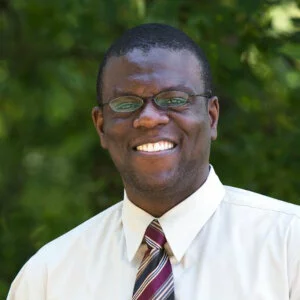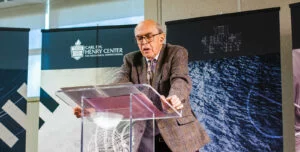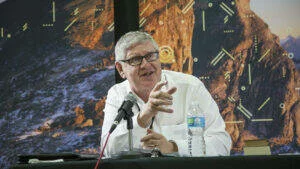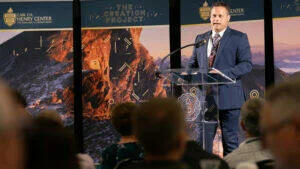For many evangelicals working within academic institutions, the science-theology debate feels like chronic pain from a stomach ulcer.
Try to suppress it from consciousness, don’t mention it in public, just press through it; perhaps find some meds to help.
Evangelical biblical scholars and theologians rarely present a clear, unequivocal picture and are hesitant about the best way forward on some of the most heated issues—the age of the earth, evolution, whether we have souls, does God perform miracles today, inerrancy, etc. These scholars tend to dismiss much of the popular material out there, and yet have nothing robust to put in its place. Opinions are kept close to the chest, for who is qualified to speak with any authority into such an intimidating, complex, churning interdisciplinary field? As one sage advised, “He who guards his mouth and his tongue keeps himself from calamity” (Prov 21:23)!
nothing robust to put in its place. Opinions are kept close to the chest, for who is qualified to speak with any authority into such an intimidating, complex, churning interdisciplinary field? As one sage advised, “He who guards his mouth and his tongue keeps himself from calamity” (Prov 21:23)!
Perhaps I’m overgeneralizing, spreading irresponsible stereotypes. If so, mea culpa, but I think most readers will recognize some validity in the picture I’ve sketched. The situation has changed over the past decade, but old habits die hard. Laypeople, for their part, have been left to their own devices; they are justifiably confused and distrustful of scholars. It’s not surprising that when they need help they turn to well-intentioned, popular, online ministries that seem to have clear answers to these problems: “You can’t trust these wishy-washy academics; we’ll show you how to read the Bible faithfully.”
This uneasy tension was the status quo in evangelicalism for much of the last century and into our present one. The tale has many twists and turns, but to simplify it to one of its main plots, we now find ourselves caught between two poles . . .
A Tale of Two Strategies
On one side we have God-fearing evangelicals who are deeply reverent towards Scripture as divine revelation. They respect science when it is judged legitimate but they are cautious about embracing mainstream scientific proposals, especially when these conflict with particular readings of Scripture. After all, scientists are human beings too; they are finite and fallen and thus prone to error in their judgments. Scientific data are not neutral, self-interpreting “facts,” which is why they always require human interpretation if anyone is to make sense of them. Thus, we should not be overly beholden to the received scientific view, or we may find ourselves ignoring the spiritual battle that runs through all of life (Eph 6:12)—scientific endeavors included. Our theological assumptions are part of the overall equation and must be made explicit; indeed, if we are seeking a genuinely Christian approach, the authority of Scripture should play a central role in our theory formation. Let us call this Strategy 1.
On the other side are equally serious evangelicals who emphasize instead the joy and delight of investigating God’s rich creation. Christians should be thrilled about the mind-boggling, expanding possibilities of science today. What a time to be alive. Being a scientist who gets to explore and research creation is a wonderful gift from a glorious Creator. Such activities have the blessing of God himself, and we should not take that lightly. If we unnecessarily or reflexively disrespect the deliverances of careful scientific study, we may find ourselves disrespecting the God who enables and takes pleasure in them himself. The scientific enterprise at its best is deeply rooted in the doctrines of creation, common grace, and general revelation. Let us call this Strategy 2.
These two poles each have their distinctive strengths, but they both have telling weaknesses. And therein lies the rub. For Strategy 1, the tendency is to become fixated on populist arguments and ideas, ideas that are sometimes polarizing, needlessly polemical, and without underlying academic rigor. For Strategy 2, the tendency is to prioritize whatever is in fashion with current scientists and to weaken or even abandon a robust commitment to Scripture and inherited doctrinal tradition. Many evangelical churches and institutions gravitate toward one of these two poles.
Carving Out An Open Space
Many groups and organizations, deeply unsatisfied with these two opposing positions, have been chasing the holy grail, a viable “third way.” For example, BioLogos is a recent attempt at finding a different, more holistic way of working through these issues. The Intelligent Design movement is another significant attempt. There are many others we could mention. Whether any of these initiatives have been successful and deserve our support, well, that depends on who you talk to. What is clear, however, is the need for an open space between the various voices in the current discussion.Our aim is not to out-muscle or compete with the others, but more modestly to provide a setting and a framework within which we can enrich an already lively conversation. That is part of our burden here at Sapientia. Our aim is not to out-muscle or compete with the others, but more modestly to provide a setting and a framework within which we can enrich an already lively conversation. Our ongoing dialogue also hopes to model virtues like confidence and humility—confidence in the trustworthiness of Scripture, and humility as we engage other Christians and as we assess the deliverances of science.
But let’s be realistic. Even among our featured contributors, there will be differences of opinion on certain questions, sometimes even deep disagreement. As an example, I’m quite skeptical of recent attempts to incorporate evolutionary theory into Christian theological reflection, though I think they’re worth engaging critically; one or more of my fellow contributors may disagree with me and take a more sympathetic approach. Others might demur from the way I have framed this post and offer a different take or emphasis. Fair enough—it wouldn’t be the first time (or the last!), but that’s precisely why we need this digital forum where we try to model how evangelicals from different confessional traditions can engage in substantive yet charitable dialogue about science and theology. Sapientia will also provide the space for us to explore facets of the doctrine of creation that have often been neglected. Join us for a deeper conversation that is eager to address the important questions. The game is on!








Comments
Be the first one to make a comment!